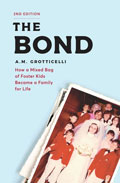
 |
The Bond: How a Mixed Bag of Foster Kids Became a Family for Life
by A.M. Grotticelli
Atmosphere Press
What comprises a loving family? Many take family relationships for granted, for better or for worse. But for some kids, the possibility of having a real family remains tantalizingly out of reach. A deep sense of unremitting yearning and pain runs through this memoir about a group of unrelated foster kids who ultimately become bonded as a family. Despite, or maybe because of, their rejection at eighteen by exploitative adults as much interested in appearances and state custody payments as in parenting their charges, the kids learn how to support one another.
Angelo Grotticelli and his three siblings endure the confusion of rejection when their alcoholic father relinquishes them to an orphanage after their mother dies of breast cancer. The maternal grandmother hides her grandkids away for a time before their father hands them over to the state. However, she loses her bid at custody because she's already caring for five other grandchildren. Plus, Angelo's father is more interested in revenge against his dead wife than in his own kids' future. The state deems Mary, the toddler, too young for life in an orphanage and places her in a foster home. She is eventually adopted. After two years of chaotic orphanage life, Angelo and his younger brother Charles and older sister Rose Ann have the good fortune of placement to a foster home on Long Island—a rarity in a system where foster families often accept only one child.
But their happiness is stretched in a new direction when the Grotticellis and their foster siblings experience a different type of dysfunctional family. The inability of their foster parents to manage a large blended family becomes quickly apparent. The Nelsons favor their own kids and treat the foster kids more as indentured servants and the source of funds they absorb to buy property for a farm that never materializes. It seems as if the natural children are the winners in this situation, but both the Nelson kids and the foster ones grapple with feelings of rejection. The mixed bag of semi-stability and the ongoing consciousness of not really belonging paired with the constant chores inherent in a large family home simultaneously cause the foster kids to doubt themselves. Yet, these things also stimulate character building. When the eldest foster kid is legally adopted, the others long for the same validation that never happens except in their newfound ability to support one another. They soon learn to share the milestones of their lives— holidays, graduations, weddings, births—and come together with the same heartfelt attention that blood relatives bring to the highlights of their daily lives.
Grotticelli writes with clear-eyed candor and much forgiving grace about the neglect of his dysfunctional parents and, later, his experiences within the New York State foster care system of the 1970s. This is no shimmering Brady Bunch story, but readers who enjoy chronicles of unusual family situations such as Jeannette Walls' The Glass Castle and Augusten Burroughs' Running with Scissors will devour the sometimes raw and sometimes amusing narrative of this book in one long sitting. In some ways, this memoir is also an exposé of the state foster care systems that sometimes fall short in their mission to provide safe, nurturing homes for neglected or battered kids. Grotticelli's story pays tribute to the unexpected depth and resilience of the human spirit that steered him, his siblings, and his fellow foster kids through unpleasant situations into a more cohesive lifestyle of their own choosing.
RECOMMENDED by the US Review